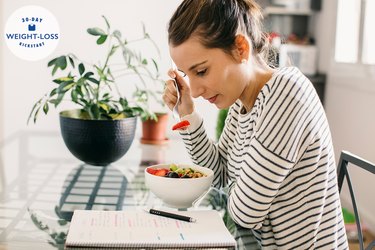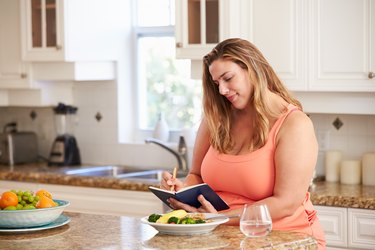
Whether you're looking to lose weight or just start eating healthier, keeping a food diary can help you stay on track with your goals. Why? Because food diaries bring awareness to what and how much you're actually eating, so you can detect patterns and make appropriate changes to trigger the results you want.
"Knowing what you're eating and when you're eating it is very helpful for sticking to any diet for weight loss," says Suzanne Dixon, a registered dietitian based in Portland, Oregon.
Video of the Day
Video of the Day
Food journaling is especially useful when it comes to getting a handle on "portion creep," Dixon adds, which she describes as the tendency for portion sizes to slowly increase over time — a surefire sabotage to any healthy eating plan.
In a February 2019 study in the journal JMIR Mhealth Uhealth, 105 overweight people were asked to track their food intake via a smartphone app for several months. Even those who didn't follow a particular diet plan lost clinically significant amounts of weight during the time period.
And another study, published the same month in Obesity, found that among the 142 participants with overweight or obesity, those who logged what they ate most consistently also lost the most weight.
But even if weight loss isn't your goal, and you're simply trying to clean up your diet, tracking your food can help you stay on the straight and narrow.
Whether you choose to note your noshes digitally or by way of pen and paper, here are a few dietitian-approved tips for getting the most out of the experience.
"You might realize, 'Ah ha, every time I sit down to balance the checkbook or pay the bills, I start by rummaging through the kitchen.'"
DO: Track Your Mood
Yes, calories are important when it comes to weight loss and maintenance, but it's also a good idea to take note of how you feel before eating certain foods, as well as any emotions-based patterns you notice when it comes to your meals or snacks. In your journal, create a designated space to list your mood next to each food choice.
"Some people want to better understand how their food choices are affected by their mood, and vice versa," says Dixon. "Even if you only record the information afterward, you can detect important patterns you might not otherwise see."
For example, you may find that you use food to procrastinate or soothe stress. "You might realize, 'Ah ha, every time I sit down to balance the checkbook or pay the bills, I start by rummaging through the kitchen,'" says Dixon. Your food/mood recording in this case might be: "Mood just before eating: dreading bill paying. Food: potato chips."
If you find that food and certain emotions are linked for you, you may be able to learn to deal with those emotions in a healthier way than reaching for a snack, such as practicing yoga, meditating or even listening to music, Dixon says.
Read more: 25 of the Best Stress-Relief Techniques
DO: List All Nutrition Facts (Not Just Calories)
"Although being in a calorie deficit will likely cause weight loss, I encourage people to look at all nutrients, such as fat, protein, fiber and sugar," explains Natalie Rizzo, a registered dietitian based in New York City. "If you're eating 400 calories worth of desserts and skipping meals, it's likely that you'll feel crappy, be lacking in protein and fiber and eating too much sugar."
Aim to regularly choose lower-calorie and nutrient-dense foods, such as fruits, vegetables, whole grains, dairy and lean protein, Rizzo says, which help support good health beyond just weight loss.
DON'T: Ignore Hunger Cues
Taking note of your appetite helps you understand it better, and trying to ignore hunger pangs can skew your data. "For instance, if you think it's not the 'right time' to eat because you ate an hour or so ago, you might ignore that hunger and try to hold off," says Rizzo.
The issue here is twofold: Ignoring hunger now can cause you to become ravenous and eat too much later on, and it also makes you less likely to notice patterns in your appetite that may be helpful in meal planning.
DO: Note Portion Sizes
You have to keep track of portion sizes for a food diary to be an effective weight-loss tool. After all, calorie and nutrition content will vary depending on how much of a food you consume.
For packaged foods like KIND bars, you can easily scan the label for nutrition facts. But for produce and protein, like blueberries or chicken, you have to measure or weigh them to accurately determine their nutrition content, says Rizzo, who recommends investing in a food scale for this reason.

DO: Include Everything You Eat (Really, Everything)
"It's very easy to miss calories — the splash of cream in your coffee, the bite of a doughnut during a meeting, the hard candy off a coworker's desk," Dixon says. She recommends writing down everything that goes into your mouth within 30 minutes of eating it, which will help you identify a lot of empty calories you may otherwise forget about.
This is especially true for liquid calories, she adds. If weight loss is a goal and you're in a plateau, sometimes just cutting out that soda or bit of juice can make a huge difference. Consider beverages just as important as food in your diary.
Read more: 10 Tips to Push Past a Weight-Loss Plateau
DON'T: Keep a Diary Just Because Someone Else Told You To
Is the motivation to keep a food diary internal or external?
"Has someone told you, 'You must keep a food diary to succeed with X, Y or Z nutrition goal?' If the answer is yes, this is just one more burden on your efforts to improve your health that isn't intrinsic to your own motivation," says Dixon.
If that someone is a doctor or dietitian and you've been encouraged to keep a diary for health reasons, by all means, follow that advice. But make sure you know why you're doing it and are committed to doing so for your own reasons. Without the internal motivation to track your progress and maintain the discipline required, you'll be likely to burn out shortly after starting.
DO: Record Timing, Too
It's not just about what you're eating but also when. Writing down the timing of your meals and snacks can help you discover patterns that reveal why you're eating. Is it during "lunch" hour even though you're not hungry, but because you're used to that time? Is it when you're bored or watching television late at night?
"This is especially important for weight loss," explains Dana Angelo White, a registered dietitian and nutrition consultant based in Fairfield, Conn. "If you are cramming all your calories into one portion of the day, that can lead to issues with weight loss." White recommends spacing out calories throughout the day, so your activity helps burn them off.

DO: Realize It Won't Be Completely Accurate
According to an April 2019 survey published in the journal Appetite, the majority of people are unable to estimate the caloric content of most food. Researchers showed images of common food items to 840 individuals, and found that 35 percent of the high-calorie foods were misperceived as being low-calorie foods.
Translation: Your food diary is going to be helpful, but probably not completely accurate. "If you're stalled out and in a weight-loss plateau, start multiplying the calories you think you're eating by 1.1 to 1.2. This may give you a better idea of what you're really eating," says Dixon.
Read more: How to Calculate Calories in Homemade Food
DON'T: Keep a Diary if You've Had a History of Eating Disorders
Food diaries are super rigid and could create an unhealthy fixation with food.
"I always remind people, if you have any past history of disordered eating, restricting and binging, obsessive-compulsive disorder or 'control' tendencies, a food diary may not be right for you," says Dixon. Instead, she recommends meeting with a dietitian to help you find the right approach to weight loss or maintenance.
DO: Find the Right Method for You
A plain notebook can work well, in which you keep a running, daily tally of your food consumption, written out by hand. It also offers easy customization, because you can take as much space as you need and add in specific points of interest -- like feelings of hunger or fullness — as needed.
But if you prefer a set structure or are more tech-savvy, an app may be a better fit for you. "I like the digital food diaries because they allow you to scan food and keep track of nutrients really easily," says Rizzo.
If you're into the convenience of digital, Dixon recommends the following popular apps:
"My top pick is MyFitnessPal because it's free, it's easy to use and you can even set it up to share with other MyFitnessPal users," she says. "If outside accountability is helpful for you, then this feature can be invaluable for keeping you on track."
Ready to Lose Weight?
Set yourself up for success with more from our 30-Day Weight-Loss Kickstart.
- JMIR Mhealth Uhealth: "Comparing Self-Monitoring Strategies for Weight Loss in a Smartphone App: Randomized Controlled Trial"
- No Nutritional Fear Mongering: "About"
- Obesity: "Log Often, Lose More: Electronic Dietary Self‐Monitoring for Weight Loss"
- Nutrition A La Natalie: "About Sports Dietitian Natalie Rizzo, MS, RD"
- Dana White Nutrition: "About Dana Angelo White, MS, RD, ATC"
- Appetite: "Can People Accurately Estimate the Calories in Food Images? An Optimised Set of Low- and High- Calorie Images from the food-pics database."